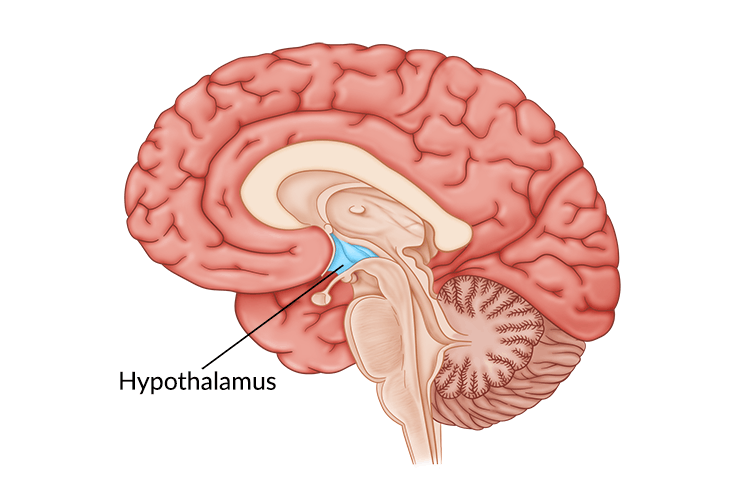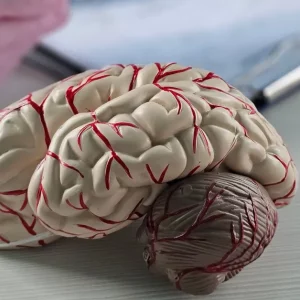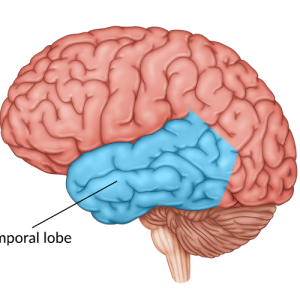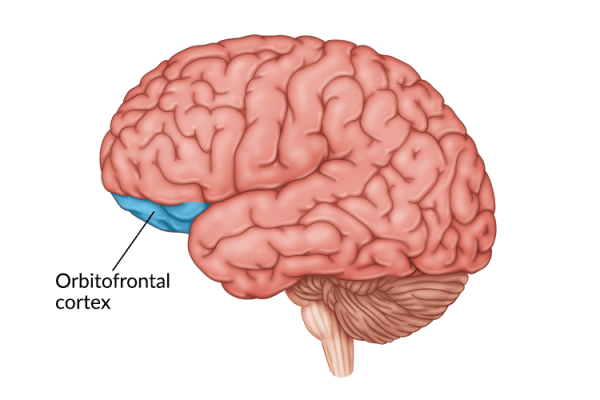Hypothalamus damage can lead to a variety of endocrine disorders, such as diabetes insipidus and hypothyroidism. While treatment for a brain injury often involves rehabilitative therapy, treatment for a hypothalamus brain injury requires a different approach due to its role in hormone regulation.
This article will discuss the causes and symptoms of hypothalamus damage and some of the most effective management techniques. Use the links below to jump straight to any section.
- Hypothalamus function
- Causes of hypothalamus damage
- Symptoms of hypothalamus injury
- Health conditions affected by hypothalamus damage
- Diagnosis
- Treatment
What Is the Function of the Hypothalamus?
The hypothalamus is a structure located in the center of the brain that serves as the primary link between the central nervous system and the endocrine system. It has a few main functions including:
- Making hormones, including vasopressin and oxytocin
- Releasing hormones that communicate with the pituitary gland
- Regulating basic functions (body temperature, hunger/thirst, sleep/wake cycles, other autonomic life-sustaining functions)
These functions are vital to maintaining homeostasis, or the body’s internal state of balance. By sending messages to the pituitary gland, the hypothalamus is able to increase or decrease the release of certain hormones (chemical messengers) into the bloodstream to help the body function properly.
The specific functions controlled and regulated by the hypothalamus include:
- Body temperature
- Blood pressure
- Respiration
- Digestive secretions
- Appetite
- Hydration
- Weight
- Breast milk production
- Salt and water balance
- Circadian rhythm (sleep-wake cycle)
- Growth
- Childbirth
- Sex drive
- Emotions and behavior
- Memory
The body sends signals to the hypothalamus alerting it when there is an imbalance in any one of these functions. In response, the hypothalamus releases hormones to balance the body.
What Hormones Does the Hypothalamus Produce?
While the hypothalamus drives the production and release of hormones, it most often secretes releasing or inhibitory hormones. These travel directly below the hypothalamus to the pituitary gland to increase or decrease related hormone secretions.
While there are many important hormones released by the hypothalamus, three examples include:
- Corticotropin-releasing hormone: stimulates the production of cortisol, a critical stress hormone
- Thyrotropin-releasing hormone: responsible for stimulating the thyroid gland, an essential part of metabolism, growth, and development of the body
- Vasopressin (antidiuretic hormone): helps the kidneys absorb water and regulate water levels throughout the body to help with blood pressure regulation
Damage to the hypothalamus can interfere with many biological processes, including homeostasis. Without the proper exchange of hormones, many organs cannot function properly. Therefore, it’s important to identify the cause of hypothalamus damage to receive the appropriate treatment.
Causes of Hypothalamus Damage
The hypothalamus—especially its anterior (front) region—is particularly vulnerable to injury during traumatic events. Research shows that approximately 27–32% of traumatic brain injuries lead to pituitary gland dysfunction, and about 49% of individuals who experience an aneurysmal subarachnoid hemorrhage also face pituitary disruptions. Given the close connection between the hypothalamus and pituitary gland, it’s likely that hypothalamic damage occurs in many of these cases as well.
Other medical conditions that may also cause hypothalamus damage, include:
- Traumatic brain injury
- Surgery
- Tumor
- Brain swelling
- Radiation treatment or chemotherapy
- Eating disorders like anorexia or bulimia
- Tuberculosis
- Aneurysm
- Pituitary apoplexy
- Inflammatory diseases like multiple sclerosis and neurosarcoidosis
- Infection due to immune system disorders
Hypothalamus damage may also occur due to genetic disorders such as the Prader-Willi syndrome, the Kallmann syndrome, or birth defects. Although the causes of hypothalamus damage may vary, the symptoms are usually the same.
Symptoms of Hypothalamus Injury
When hypothalamus damage is caused by a traumatic event, it can often be overlooked during brain injury treatment because the symptoms are similar to other types of brain injuries or medical conditions. However, many individuals experience neuroendocrine disruptions after brain injury. Therefore, it’s important to understand the signs of a hypothalamus injury to help you differentiate between the symptoms and seek the proper medical care.
Common symptoms of hypothalamus damage include:
- Fatigue and/or insomnia
- Muscle weakness
- Headache
- Frequent thirst and/or dehydration
- Unexplained weight loss or gain
- Changes in appetite or poor appetite
- High or low blood pressure
- Frequent urination
- Loss of vision
- Infertility
Symptoms of hypothalamus damage may evolve over time. Be sure to follow-up with your doctor if you notice any new or recurring symptoms after a brain injury to obtain a proper diagnosis and treatment plan.
Health Conditions Affected by Hypothalamus Damage
The hypothalamus is versatile meaning it plays a role in many different functions of the body. For this reason, when the hypothalamus sustains damage, it can result in various health conditions or complications.
Some of the most common health conditions caused by hypothalamus damage include:
- Adrenal Insufficiency: occurs when the hypothalamus cannot instruct the adrenal glands (located above the kidneys) to release cortisol into the bloodstream. This can cause weight loss, fatigue, muscle weakness, low blood pressure, vomiting, and dehydration.
- Hypothyroidism: occurs when the hypothalamus is unable to produce thyroid releasing hormone, resulting in an underactive thyroid. This can cause concentration and memory problems, unexplained weight gain, cold sensitivity, extreme fatigue, depression, constipation, infertility and/or irregular periods.
- Diabetes Insipidus: occurs when the hypothalamus does not produce enough antidiuretic hormone and the body is unable to retain enough water. Unlike other forms of diabetes after brain injury, diabetes insipidus does not affect the body’s ability to use glucose. Rather it causes symptoms such as extreme thirst, dehydration, excessive urination, dry skin, and muscle weakness.
- Growth Hormone Deficiency: occurs when the hypothalamus is unable to stimulate the production and release of sufficient amounts of growth hormone necessary for development. This can result in slow growth, osteoporosis, muscle weakness, and high cholesterol levels.
- Hypothalamic Obesity: occurs when the balance between energy intake and expenditure is disrupted by hypothalamus damage. This can lead to fast weight gain, uncontrollable appetite, low metabolism, sleep apnea, and mood disorders.
Hypothalamus damage can also lead to extreme fluctuations in body temperature. The hypothalamus plays a critical role in stabilizing the body’s core temperature. For example, when the body’s temperature is above 98.6° F, the hypothalamus signals the sweat glands to help the body cool down. Other cooling responses by the hypothalamus include increasing water retention and dilating blood vessels.
However, when the hypothalamus becomes injured, it can no longer accurately control your temperature. Therefore, you may experience frequent hot or cold flashes. A prolonged increase in core body temperature can lead to further brain damage. That’s why it is important to seek treatment as soon as possible.
How Is a Hypothalamus Injury Diagnosed?
Treatment for hypothalamus damage may vary depending on the diagnosis. To obtain a proper diagnosis and treatment plan, your medical team will perform a combination of different lab tests.
Hypothalamic dysfunction after brain injury may be measured by heart rate variability (HRV). To perform this exam, your doctor will give you a Holter monitor that records heart function over the course of 24 hours. Electrodes are placed on your chest to allow you to continue with your daily activities during this period.
The HRV measures how much your heart rate fluctuates. Changes indicate that the endocrine system is functioning well and keeping the body regulated. If there are very few or no changes it can indicate hypothalamus dysfunction. When the heart rate is either consistently high or low, it’s because there is limited communication between the body’s sympathetic and parasympathetic responses, which are autonomic functions controlled by the hypothalamus.
Other exams used to diagnose hypothalamus damage may include:
- MRI or CT scans
- Eyeball pressure tests (particularly if there is a tumor)
- Blood or saliva tests used to assess cortisol, estrogen, thyroid, and other hormone levels
With a proper diagnosis of hypothalamus damage your doctor can start you on hormone therapy to replace any deficiencies, or provide different forms of treatment.
Treatments for Hypothalamus Damage
Treatment for hypothalamus damage involves replacing lost hormones. Therefore, it’s important for all individuals to check their hormonal levels with their doctor as soon as possible after sustaining hypothalamus damage.
Some of the most common hormones your doctor may suggest to increase include:
- Antidiuretic hormone (vasopressin): which helps the body absorb more water
- Growth hormone: helps keep the bones and muscles healthy
- Hydrocortisone: is used to replace cortisol
- Progesterone: is needed for the menstrual cycle
Many of these hormones may need to be taken daily to help regulate the body and compensate for hypothalamus damage. Along with hormonal therapy, there are other management techniques that can help with a hypothalamus brain injury.
Management for hypothalamus damage may also include:
- Medication (to replace deficient hormones or to regulate affected functions)
- Surgery or radiation (to remove tumors)
- Maintaining a well-balanced diet after brain injury
- Proper sleep (about 8 hours daily)
- Exercising regularly (to boost overall health)
Every brain injury is different, and while many survivors may experience similar symptoms, treatment will vary for everyone. Speak with your doctor to ensure which course of treatment is safe and suitable for your condition.
Understanding Hypothalamus Brain Injury Recovery
Hypothalamus damage can occur due to various conditions such as a head injury, tumor, and immune diseases. The hypothalamus plays a crucial role in many of our bodily functions which can be lost after a traumatic event such as a head injury or tumor.
Fortunately, many of these functions can be improved and restored with hormonal therapy. The sooner you seek treatment, the higher the chances of improving hypothalamus damage.
We hope this article helped you understand how hypothalamus damage can occur, and encouraged you to seek the proper medical care. seek the proper medical care.
Recovery from a traumatic brain injury (TBI) is a challenging journey, but the right guidance can make all the difference. Our free eBook, “15 Recovery Tips Every TBI Survivor Should Know,” offers practical strategies and expert insights to help you or your loved one navigate the challenges of recovery – Download our FREE eBook “15 Recovery Tips Every TBI Survivor Should Know”!










